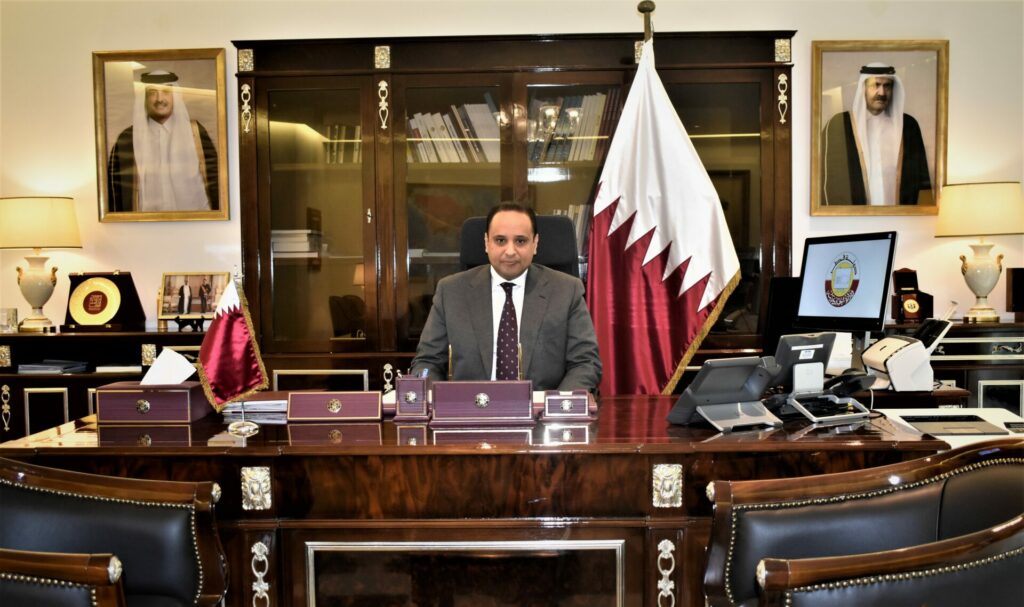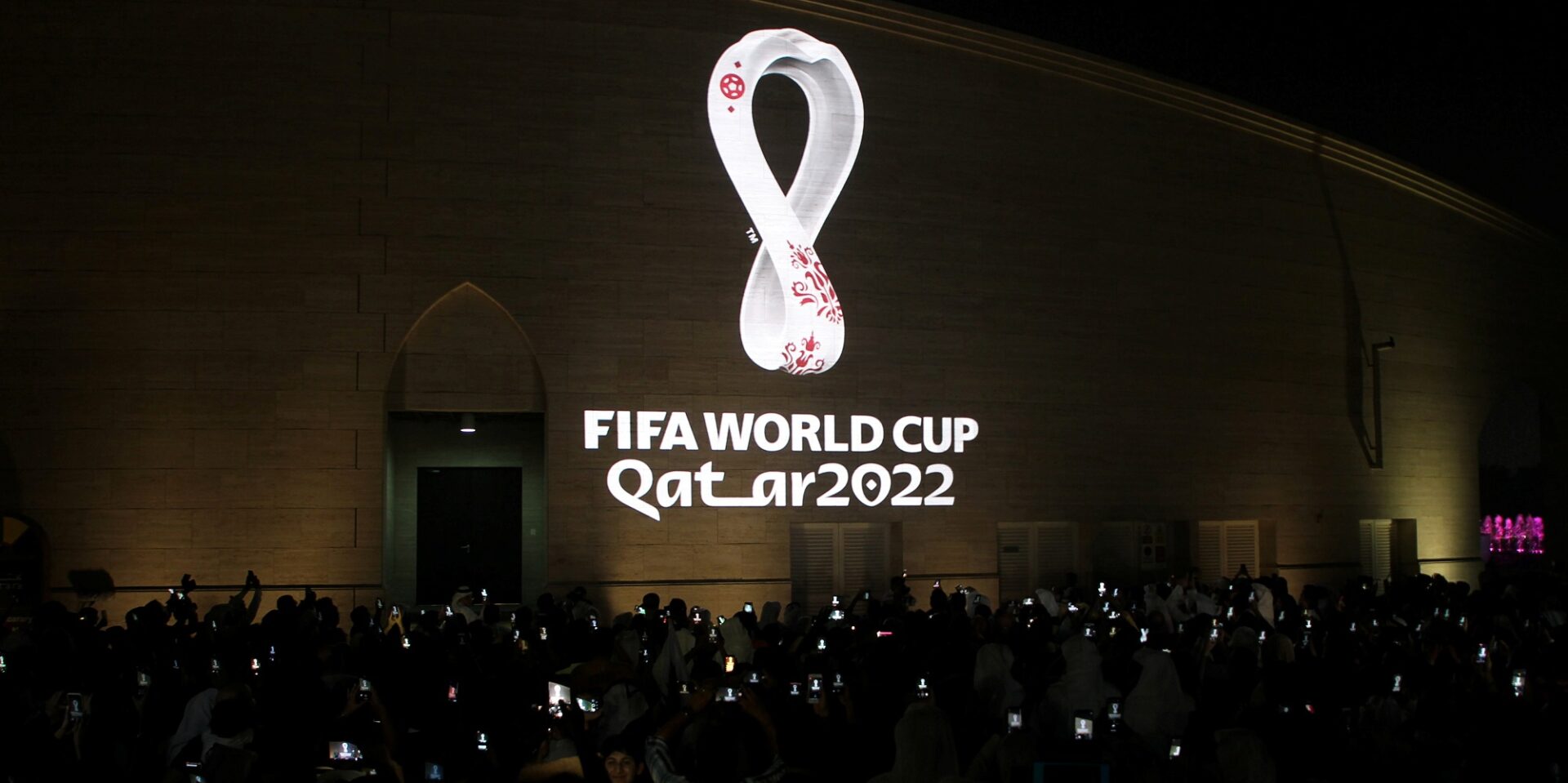Promoted by The Embassy of Qatar in Brussels. The views belong to the sponsor.
Interview with H.E Al-Hajri, Ambassador of Qatar to Belgium

HE. Ambassador Al-Hajri
What does Qatar hope to achieve by hosting the World Cup, and how does it contribute to the Qatar National Vision 2030?
On the 20th of November, Qatar will make history by bringing the world’s most watched sporting event to the Arab and Muslim World for the first time ever.
It is an opportunity to bring peoples of the world closer together and experience Arab hospitality and Qatari customs and traditions.
The FIFA World Cup Qatar 2022 is an international event whose significance is not restricted to football. It is actually a symbol of the objectives that the State of Qatar established in its National Vision 2030 which include economic diversification, support for environmental initiatives, human development and social progress. This initiative aims at transforming Qatar into a global society and ensuring the continuation of higher standards of living to its people, generation after generation.
Hosting the World Cup can therefore be considered a means to achieving Qatar National Vision as projects directly tied to this worldwide event are intended to promote posttournament sustainability. The infrastructure built to accommodate visitors during the tournament, like stadiums, a modern metro system, the expansion of the airport and the construction of new districts, are all structural developments in non-energy sectors. The sustained growth of these sectors will constitute a priority for Qatar after the World Cup concludes.
The QNV 2030 strives to diversify Qatar's economy in which the private sector plays a prominent role. In this regard, Qatar aims to transform World Cup infrastructure into new communities, schools, and hospitals as well as providing attractions for tourists. Actually, Qatar's benefits from the 2022 World Cup go beyond the economic aspect. Most importantly, it will shed light on what the country has gained and will gain in building a positive, social, economic and cultural legacy for the country, the region and the world.
Discussion on economic impact, FDI, and the Qatar National Vision 2030
By focusing on multiple sectors such as sports, infrastructure, healthcare, culture, and environment, the National Development Strategy makes Qatar fully prepared for the tournament that every Qatari, Arab and sports fan around the world awaits.
The country aims to grow its non-energy economy, with ambitions to become a regional business and tourism hub. Hosting the World Cup is a step on the way to realizing these ambitions, as the infrastructure developed ahead of the tournament was designed to strengthen transport connectivity and grow the local business environment.
In fact, Qatar’s investment and development goals had already started before the FIFA World Cup 2022. In January 2019, Law No.1 of 2019 regulating the investment of nonQatari capital in economic activity became effective and allowed foreign investors to own 100 percent of capital in all sectors to facilitate FDI inflows, eliminating the previous limit of 49 percent foreign ownership. And in 2020, Qatar introduced a public-private partnership law that enhances the confidence of investors in partnership projects in Qatar.
Progress has been made in the country’s economic diversification agenda. The share of the oil and gas sector’s contribution to GDP decreased due partly to large investments in universities, research centres, hospitals, Hamad Port and Hamad International Airport, among others. That said, the transformative nature of a sporting event of such a large magnitude goes beyond immediate economic effects, and the intangible nature of these benefits should be taken into consideration when considering its legacy.
Current plans to become less dependent on oil and gas to create a more diversified economy?
Despite global challenges, Qatar's growth rates have remained strong. Our economic performance and positive international ratings have demonstrated our strong economic foothold and fiscal position over the years. Qatar’s economy is forecasted to be the fastest growing in the GCC in 2023 and 2024.
Qatar is aware of the importance of balancing its economic policies which aim to create a diversified national economy while strengthening its natural resources.
In this context, Qatar has created a legislative framework to develop business and attract investments. It implemented flexible economic policy to facilitate business and investment, while also giving special privileges to non-Qatari foreign investors allowing them to provide up to 100% of capital for any project and exempting them from income tax for up to 10 years. Qatar also launched important partnership projects between the private and public sectors, while providing promising investment opportunities in various sectors including logistics, food security, education, health and sports. The country increased government spending on infrastructure projects with the aim of strengthening the competitiveness of Qatar’s economy on the regional and international level.
Qatar continues to focus on the energy sector as an important source of national revenue by working towards increasing natural gas production levels, which reinforces Qatar’s position as one of the the biggest producers and exporters of LNG in the world. The systematic economic policies adopted have contributed to supporting all of the country’s sectors so that they strengthen the national economy and enhance investor confidence.
In its efforts to diversify energy sources, Qatar has reached a milestone as it inaugurated Al-Kharsaah Solar PV Power Plant in October 2022. The country’s first large-scale solar plant has 1.8 million solar panels, which will provide sustainable, affordable and clean energy to Qatari citizens and businesses.
Qatar also signed agreements to construct the Ammonia-7, the industry's first large-scale Blue Ammonia project, valued at approximately $1 billion.
These projects reflect Qatar’s commitment to developing renewable energy sources.
Tourism investment goals? And how does development of the tourism industry impact FDI in non-tourism sectors. What are the longer-term drivers for increased tourism in Qatar?
Located in the heart of the Middle East, Qatar is a unique destination that blends cultural heritage with modernity.
In less than a month from now, an estimated one million plus visitors will enjoy the first World Cup to be held in the Arab World and all eyes will turn to witness the achievements undertaken not only to host this international event but also to make Qatar a major longterm tourism destination.
Tourism is one of five priority sectors integral to diversifying Qatar’s economy. The sector introduces profitable opportunities for developers and investors through an approach joining the public and private sectors.
Hosting international events and developing projects such as the Doha Metro, the National Museum of Qatar, Msheireb Downtown Doha, among others, increases Qatar’s attractiveness as a tourism destination.
The FIFA World Cup 2022 will be the platform through which we welcome visitors and encourage them to keep coming beyond the tournament.
At the same time, Qatar has been regularly hosting sports events, providing a continuous stream of opportunities in the sector. These events not just attract tourists and spectators, but also allow Qatar to display its hospitality and infrastructure with the aim to attract 5.6 million visitors by 2030 aided by Qatar’s National Tourism Strategy 2030.
Qatar Tourism, the body responsible for the development and promotion of tourism in the country, is cooperating with various public bodies, policy advocates, tourism-enabling entities, and private enterprises to improve the business environment, diversify the country’s tourism portfolio and increase visitor traffic as well as spending.
Qatar also made great efforts to be ranked among the top tourist destinations, both in terms of leisure and MICE tourism (Meetings, Incentives, Conferences & Exhibitions).

